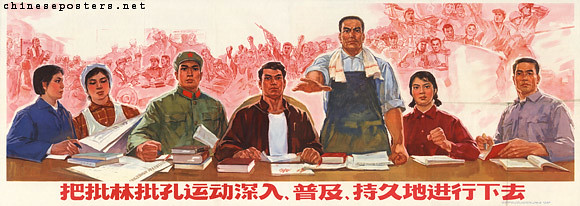Chinese Women under Confucianism
(ChinesePosters: "Continue to thoroughly, pervasively and permanently carry out the criticise Lin and criticise Confucius campaign")
As a philosophy that had profound impacts on the social, economic, and political life of regions in East Asia, Confucianism is one of the most important steps in examining Chinese history. Although Confucianism contains a lot of great philosophies, some ideas it promotes are obsolete when examining it with a contemporary lens. For example, the strict hierarchy and obedience in terms of family structure and social roles in Confucianism are some of the reasons why marriage became a form of bondage for Chinese women.
(ChinesePosters: "Study Lu Xun's revolutionary spirit, to become a revolutionary vanguard in criticizing Lin Biao and Confucius!")
In the patriarchal, authoritarian, Confucian family system, there was “awe for the father, and also for the elder brother. Wife and children, servants, and concubines are like the common people, serfs and underlines.” In Lun Yu, the collection of Confucius’ teachings, it only includes a single quote on women, indicating the little importance he attached to women. In the Yin-Yang theory, while men represent the Yang, the positive side that’s related to heaven, light, and strength, women represent the Yin, the negative side that’s associated with darkness and weakness. In general, the majority in China still believes in the traditional ideology, making it difficult to initiate real structural change with policies.
Main Text of Confucianism: The Four Books and Five Classics
“The Four Books and Five Classics” constitute the foundation for Confucianism. The four books—the Doctrine of the Mean, the Great Learning, Mencius, and the Analects—include Kongzi’s (Confucius) teachings, his discussions with disciples, and writings by successors of Confucius doctrines like Mencius. The five classics—the Book of Odes, Book of Documents, Book of Changes, Book of Rites, and the Spring and Autumn Annals—talk about metaphysics, politics, poetry, societal order, and history. Even though Confucianism is not an organized religion, it could be seen as the equivalent for Christianity in China, and the collection of texts could be understood as the Bible of China—containing teachings and rules for what to do and what not to do that could be interpreted in different ways under a modern lens.

